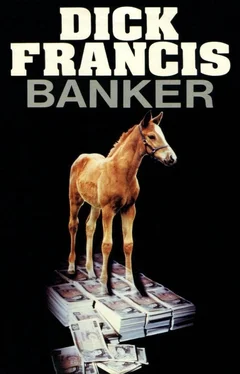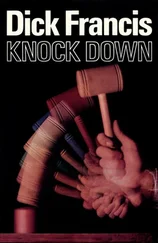‘Like what?’
‘Like being an actor. Or a doctor. Or an acrobat.’
‘It’s been too late for that since you were six.’
‘Yeah,’ he said. ‘Lousy, isn’t it?’ He put his heart and soul ten minutes later, however, into tracking down a source of a hundred thousand for several years and lending it to a businessman at a profitable rate, knitting together such loan packages all afternoon with diligence and success.
I hoped he would stay. He was the yeast of the office: my bubbles in the dough. As for myself, I had grown accustomed to being on the board and had slowly found I’d reached a new level of confidence. Gordon seemed to treat me unreservedly as an equal, though it was not until he had been doing it for some time that I looked back and realized.
Gordon’s hitherto uniformly black hair had grown a streak or two of grey. His right hand now trembled also, and his handwriting had grown smaller through his efforts to control his fingers. I watched his valiant struggles to appear normal and respected his privacy by never making even a visual comment: it had become second nature to look anywhere but directly at his hands. In the brain department he remained energetic, but physically over all he was slowing down.
I had only seen Judith once since Christmas, and that had been in the office at a retirement party given for the head of Corporate Finance, a golden-handshake affair to which all managers’ wives had been invited.
‘How are you?’ she said amid the throng, holding a glass of wine and an unidentifiable canapé and smelling of violets.
‘Fine. And you?’
‘Fine.’
She was wearing blue, with diamonds in her ears. I looked at her with absolute and unhappy love and saw the strain it put into her face.
‘I’m sorry,’ I said.
She shook her head and swallowed. ‘I thought... it might be different... here in the bank.’
‘No.’
She looked down at the canapé, which was squashy and yellow. ‘If I don’t eat this damned thing soon it’ll drop down my dress.’
I took it out of her fingers and deposited it in an ashtray. ‘Invest in a salami cornet. They stay rock-hard for hours.’
‘What’s Tim telling you to invest in?’ demanded Henry Shipton, turning to us a beaming face.
‘Salami,’ Judith said.
‘Typical. He lent money to a seaweed processor last week. Judith, my darling, let me freshen your glass.’
He took the glass away to the bottles and left us again looking at each other with a hundred ears around.
‘I was thinking,’ I said, ‘When it’s warmer, could I take you and Gordon, and Pen if she’d like it, out somewhere one Sunday? Somewhere not ordinary. All day.’
She took longer than normal politeness to answer, and I understood all the unspoken things, but finally, as Henry could be seen returning, she said, ‘Yes. We’d all like it. I’d like it... very much.’
‘Here you are,’ Henry said. ‘Tim, you go and fight for your own refill, and leave me to talk to this gorgeous girl.’ He put his arm round her shoulders and swept her off, and although I was vividly aware all evening of her presence, we had no more moments alone.
From day to day when she wasn’t around I didn’t precisely suffer: her absence was more of a faint background ache. When I saw Gordon daily in the office I felt no constant envy, nor hated him, nor even thought much of where he slept. I liked him for the good clever man he was, and our office relationship continued unruffled and secure. Loving Judith was both pleasure and pain, delight and deprivation, wishes withdrawn, dreams denied. It might have been easier and more sensible to have met and fallen heavily for some young glamorous unattached stranger, but the one thing love never did have was logic.
‘Easter,’ I said to Gordon one day in the office. ‘Are you and Judith going away?’
‘We had plans — they fell through.’
‘Did Judith mention that I’d like to take you both somewhere — and Pen Warner — as a thank you for Christmas?’
‘Yes, I believe she did.’
‘Easter Monday, then?’
He seemed pleased at the idea and reported the next day that Judith had asked Pen, and everyone was poised. ‘Pen’s bringing her kite,’ he said. ‘Unless it’s a day trip to Manchester.’
‘I’ll think of something,’ I said, laughing. ‘Tell her it won’t be raining.’
What I did eventually think of seemed to please them all splendidly and also to be acceptable to others concerned, and I consequently collected Gordon and Judith and Pen (but not the kite) from Clapham at eight-thirty on Easter Bank Holiday morning. Judith and Pen were in fizzing high spirits, though Gordon seemed already tired. I suggested abandoning what was bound to be a fairly taxing day for him, but he wouldn’t hear of it.
‘I want to go,’ he said. ‘Been looking forward to it all week. But I’ll just sit in the back of the car and rest and sleep some of the way.’ So Judith sat beside me while I drove and touched my hand now and then, not talking much but contenting me deeply by just being there. The journey to Newmarket lasted two and a half hours and I would as soon it had gone on for ever.
I was taking them to Calder’s yard, to the utter fascination of Pen. ‘But don’t tell him I’m a pharmacist,’ she said. ‘He might clam up if he knew he had an informed audience.’
‘We won’t tell,’ Judith assured her. ‘It would absolutely spoil the fun.’
Poor Calder, I thought: but I wouldn’t tell him either.
He greeted us expansively (making me feel guilty) and gave us coffee in the huge oak-beamed sitting room where the memory of Ian Pargetter hovered peripherally by the fireplace.
‘Delighted to see you again,’ Calder said, peering at Gordon, Judith and Pen as if trying to conjure a memory to fit their faces. He knew of course who they were by name, but Ascot was ten months since, and although it had been an especially memorable day for him he had met a great many new people between then and now. ‘Ah yes ,’ he said with relief, his brow clearing. ‘Yellow hat with roses.’
Judith laughed. ‘Well done.’
‘Can’t forget anyone so pretty.’
She took it as it was meant, but indeed he hadn’t forgotten: as one tended never to forget people whose vitality brought out the sun.
‘I see Dissdale and Bettina quite often,’ he said, making conversation, and Gordon agreed that he and Judith, also, sometimes saw Dissdale, though infrequently. As a topic it was hardly riveting, but served as an acceptable unwinding interval between the long car journey and the Grand Tour.
The patients in the boxes were all different but their ailments seemed the same; and I supposed surgeons could be excused their impersonal talk of ‘the appendix in bed 14’, when the occupants changed week by week but the operation didn’t.
‘This is a star three-day-eventer who came here five weeks ago with severe muscular weakness and no appetite. Wouldn’t eat. Couldn’t be ridden. He goes home tomorrow, strong and thriving. Looks well, eh?’ Calder patted the glossy brown neck over the half-stable door. ‘His owner thought he was dying, poor girl. She was weeping when she brought him here. It’s really satisfying, you know, to be able to help.’
Gordon said civilly that it must be.
‘This is a two-year-old not long in training. Came with an intractably infected wound on his fetlock. He’s been here a week, and he’s healing. It was most gratifying that the trainer sent him without delay, since I’d treated several of his horses in the past.’
‘This mare,’ Calder went on, moving us all along, ‘came two or three days ago in great discomfort with blood in her urine. She’s responding well, I’m glad to say.’ He patted this one too, as he did them all.
Читать дальше




